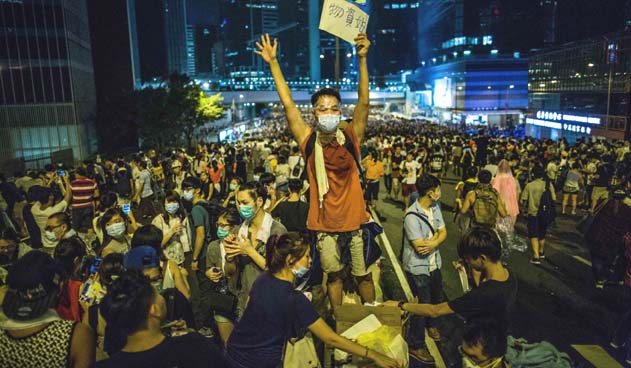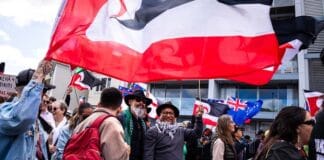The occupation of large sections of the city continues with no signs that the government is willing to discuss the demands of the protesters. Barricades have been erected using street furniture, wooden pallets, cable ties and bike locks at some of the busiest intersections of Hong Kong.
During the day, the main protest site of Admiralty is now held by just a few hundred dedicated occupiers, with around 50 or 60 people at Mong Kok and Causeway Bay. However at around 4pm these numbers swell with school and university students returning from class to spend the evening. Workers arrive a little after 6pm with many having a routine of work in the morning, occupying in the evening and home again at night to sleep and recharge. Some stay overnight to protect the occupation.
The protests sites are well equipped with supply tents for food and water, medical assistance and yellow ribbons for distribution amongst supporters. In Admiralty a data projector beams messages of support from around the world in real time onto a building.
Last Friday night protesters surged back into Admiralty in their thousands to rally against the cancellation of talks with protest leaders. They were responding to a call from the Hong Kong Federation of Students (HKFS) and Occupy Central (OC). But many in the movement see a lack of leadership as a virtue. The three main organising groups of Scholarism, OC and the HKFS have lost some standing with protesters after attempts to wind down the occupations, but they are still capable of mobilising great numbers.
At the end of the first week of protests, OC and HKFS leaders elected not to block government offices. Some protesters disagreed, saying that disruption to the government’s operations would be necessary to get their demands for democracy heard.
Tam Lok Hang, a 23 year old music teacher at the Causeway Bay site said, “We are occupying so of course we should affect them [government workers]. We want to force the government to listen to our demands.”
Socialist Action are one of the few groups distributing political material at the occupation sites. They call for the occupation to continue and for a democratic organising committee to be set up, something that is sorely lacking. There are strike committees at the eight public Hong Kong universities but since the initial week-long strike that ushered in the Umbrella Revolution, they seem unable to organise further student strikes.
The Mong Kok site has seen the most violent clashes between protesters and thugs who many suspect are paid by the authorities and have connections to organised crime. Conspicuous for the blue ribbon they wear, they claim to be concerned citizens and local shop owners whose income is being affected by the protests.
The protests enjoy popularity amongst large sections of the population but there have been few efforts to build support among the organised working class. In the first few days the Hong Kong Confederation of Trade Unions called for strike action, and 10,000 workers including the teachers’ and social workers’ unions responded. Many Hong Kongers are under pressure to work long hours in order to survive, living in cramped conditions and “cage homes” whilst the city’s elite live in luxury.
But union membership is low, and split between different union federations. One of them is backed by the Chinese government. Its construction union sent a group to the occupation to demand that the protesters go home. But the following day a group of ten workers from the union arrived with signs saying they supported the protest. Construction workers have also brought bamboo and building materials to strengthen barricades.
Demands for a higher minimum wage, shorter working hours and affordable public housing could help to reach out to workers.
By Matte Rochford in Hong Kong






